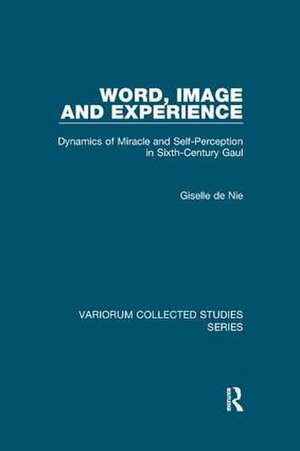Word, Image and Experience: Dynamics of Miracle and Self-Perception in Sixth-Century Gaul: Variorum Collected Studies
Autor Giselle de Nieen Limba Engleză Paperback – 10 iun 2019
Din seria Variorum Collected Studies
-
 Preț: 343.33 lei
Preț: 343.33 lei -
 Preț: 313.38 lei
Preț: 313.38 lei - 9%
 Preț: 1041.23 lei
Preț: 1041.23 lei -
 Preț: 311.41 lei
Preț: 311.41 lei -
 Preț: 386.77 lei
Preț: 386.77 lei - 9%
 Preț: 938.85 lei
Preț: 938.85 lei -
 Preț: 299.55 lei
Preț: 299.55 lei -
 Preț: 386.77 lei
Preț: 386.77 lei -
 Preț: 310.22 lei
Preț: 310.22 lei -
 Preț: 258.66 lei
Preț: 258.66 lei - 18%
 Preț: 949.32 lei
Preț: 949.32 lei - 9%
 Preț: 938.44 lei
Preț: 938.44 lei -
 Preț: 312.75 lei
Preț: 312.75 lei -
 Preț: 351.48 lei
Preț: 351.48 lei -
 Preț: 310.55 lei
Preț: 310.55 lei -
 Preț: 311.18 lei
Preț: 311.18 lei - 9%
 Preț: 936.60 lei
Preț: 936.60 lei -
 Preț: 341.55 lei
Preț: 341.55 lei -
 Preț: 320.00 lei
Preț: 320.00 lei - 34%
 Preț: 764.20 lei
Preț: 764.20 lei - 22%
 Preț: 312.43 lei
Preț: 312.43 lei - 34%
 Preț: 739.65 lei
Preț: 739.65 lei - 34%
 Preț: 764.20 lei
Preț: 764.20 lei - 34%
 Preț: 680.73 lei
Preț: 680.73 lei - 26%
 Preț: 247.40 lei
Preț: 247.40 lei - 34%
 Preț: 485.78 lei
Preț: 485.78 lei - 34%
 Preț: 769.51 lei
Preț: 769.51 lei - 34%
 Preț: 764.20 lei
Preț: 764.20 lei - 34%
 Preț: 826.68 lei
Preț: 826.68 lei - 25%
 Preț: 222.32 lei
Preț: 222.32 lei - 25%
 Preț: 225.54 lei
Preț: 225.54 lei - 34%
 Preț: 764.20 lei
Preț: 764.20 lei - 34%
 Preț: 736.38 lei
Preț: 736.38 lei - 34%
 Preț: 738.42 lei
Preț: 738.42 lei - 25%
 Preț: 226.52 lei
Preț: 226.52 lei - 33%
 Preț: 491.66 lei
Preț: 491.66 lei - 34%
 Preț: 485.78 lei
Preț: 485.78 lei - 34%
 Preț: 485.78 lei
Preț: 485.78 lei - 34%
 Preț: 767.07 lei
Preț: 767.07 lei - 34%
 Preț: 764.20 lei
Preț: 764.20 lei - 34%
 Preț: 764.20 lei
Preț: 764.20 lei - 34%
 Preț: 736.38 lei
Preț: 736.38 lei - 31%
 Preț: 473.94 lei
Preț: 473.94 lei - 18%
 Preț: 807.71 lei
Preț: 807.71 lei - 34%
 Preț: 764.20 lei
Preț: 764.20 lei - 34%
 Preț: 764.20 lei
Preț: 764.20 lei - 34%
 Preț: 764.20 lei
Preț: 764.20 lei - 51%
 Preț: 485.78 lei
Preț: 485.78 lei - 34%
 Preț: 485.78 lei
Preț: 485.78 lei - 34%
 Preț: 766.65 lei
Preț: 766.65 lei
Preț: 305.32 lei
Preț vechi: 344.48 lei
-11% Nou
Puncte Express: 458
Preț estimativ în valută:
58.46€ • 60.24$ • 49.06£
58.46€ • 60.24$ • 49.06£
Carte tipărită la comandă
Livrare economică 22 februarie-08 martie
Preluare comenzi: 021 569.72.76
Specificații
ISBN-13: 9781138375550
ISBN-10: 1138375551
Pagini: 390
Dimensiuni: 156 x 234 mm
Greutate: 0.73 kg
Ediția:1
Editura: Taylor & Francis
Colecția Routledge
Seria Variorum Collected Studies
Locul publicării:Oxford, United Kingdom
ISBN-10: 1138375551
Pagini: 390
Dimensiuni: 156 x 234 mm
Greutate: 0.73 kg
Ediția:1
Editura: Taylor & Francis
Colecția Routledge
Seria Variorum Collected Studies
Locul publicării:Oxford, United Kingdom
Cuprins
Contents: Introduction: Visions of the heart; Self-Perception: a permeable vessel: Is a woman a human being? Precept, prejudice and practice in 6th-century Gaul; The body, fluidity and personal identity in the world view of Gregory of Tours; Contagium and images of self in late 6th-century Gaul; Images of invisible dynamics: self and non-self in 6th-century saints' lives; Symbolic action: Miracle - or magic?: Caesarius of Arles and Gregory of Tours: two 6th-century Gallic bishops and 'Christian magic'; Iconic alchemy: the dynamic of images: A broken lamp or the effluence of holy power? Common sense and belief-reality in Gregory of Tours' own experience; Seeing and believing in the early Middle Ages: a preliminary investigation; Gregory of Tours' smile: spiritual reality, imagination and earthly events in the 'Histories'; History and miracle: Gregory's use of metaphor; The poet as visionary: Venantius Fortunatus' 'new mantle' for St Martin; Iconic alchemy: imaging miracles in late 6th-century Gaul; Word, image and experience in the early medieval miracle story; Fatherly and motherly curing in 6th-century Gaul: St Radegund's mysterium; Poetics of wonder: dream-consciousness and transformational dynamics in 6th-century miracle stories; The miracle in language: The 'power' of what is said in the book: word, script and sign in Gregory of Tours; Text, symbol and 'oral culture' in the 6th-century church: the miracle story; The language in miracle - the miracle in language: words and the Word according to Gregory of Tours; Index.
Notă biografică
Giselle de Nie is an independent scholar; until her retirement, she was in the Department of Medieval History, University of Utrecht, The Netherlands
Recenzii
'The great value of de Nie's work lies [...] in probing the very areas that many historians seek to avoid - namely the imagination, the actual nature of miracles and a spiritual rather than a sensory reality...' Early Medieval Europe
Descriere
Focusing on the works of bishop Gregory of Tours (539-594) and the poet Venantius Fortunatus (540-c.604), in later life bishop of Poitiers, Dr de Nie gives in these innovative studies a new understanding of the miracle stories that populate their writing, but are so often dismissed as of little worth. Their perceptions of miracles - and their renderings of the human self-awareness through which miracles are perceived and happen - are analysed as attempts, mostly rooted in models from the Bible, to adjust the early Christian tradition so as to make sense of, and protect themselves in, the highly insecure environment of 6th-century Gaul. Drawing on modern anthropological and psychological studies, notably in the area of spiritual healing practices, she demonstrates how these can be used to throw fresh light on the world of Late Antiquity, exploring attitudes towards sanctity, power and authority, along with questions such as the perception of bodily purity and the status of women. The volume include five essays not previously published in English.
